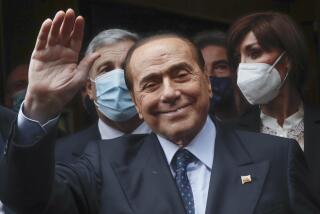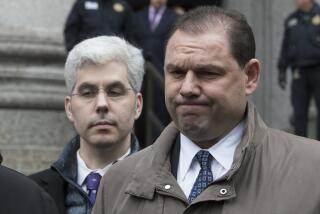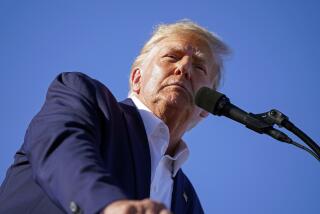Italy’s Corruption Scandal Ensnares Craxi, 2 Executives
- Share via
ROME — Italy’s worst corruption scandal ensnared a former prime minister Tuesday, and the business world recoiled from the arrest of two of the country’s most senior state industry executives.
As opposition voices demanded a new government, a parliamentary commission voted to strip former Prime Minister Bettino Craxi of his legislative immunity. Craxi had faced 41 accusations of corruption, participating in illegal party financing and receiving bribes.
The full Chamber of Deputies must endorse the commission’s vote before Milan magistrates can prosecute Craxi, who was prime minister from 1983 until 1987.
Claiming innocence, Craxi, 59, who lost his post as head of the Socialist Party when charges were first announced, failed to convince the 20-member commission that the charges represent a political vendetta. The chamber nearly always follows the recommendation of the commission, which found cause for judicial investigation into 35 of the accusations.
At the same time, jailing of the president of the $30-billion state energy conglomerate Ente Nazionale Idrocarburi (ENI) fueled national alarm at the seemingly limitless size and scope of the corruption, whose impact is shaking Italy’s government and institutions.
ENI Chairman Gabriele Cagliari, 66, and Franco Ciatti, 65, head of Nuovo Pignone, ENI’s engineering subsidiary, were arrested on corruption charges. They are being held in Milan at San Vittore prison.
At an anxious Cabinet meeting in Rome on Tuesday, the sagging government of Prime Minister Giuliano Amato backed away from an abortive decree to contain the scandal by retroactively declaring illegal party financing a civil rather than a criminal offense.
Craxi is among the most prominent political victims of the year-old investigation called Operation Clean Hands. Three Cabinet ministers and the leader of a small liberal party resigned after being accused of complicity in what has been revealed as a multibillion-dollar, nationwide system of financing political parties through kickbacks on public contracts.
With about 1,000 public officials and business leaders already implicated, the investigation has struck deeply into the Italian economy, halting public works under way and stalling new projects.
More to Read
Sign up for Essential California
The most important California stories and recommendations in your inbox every morning.
You may occasionally receive promotional content from the Los Angeles Times.













